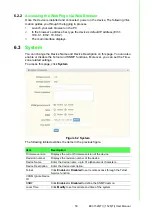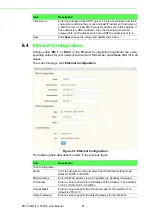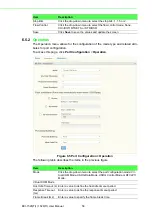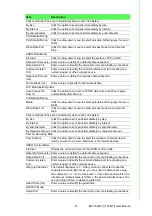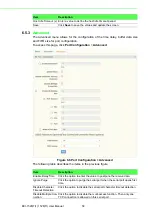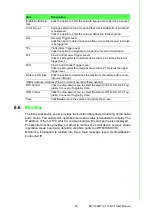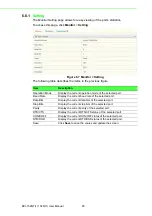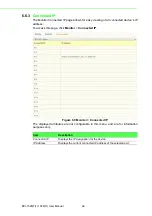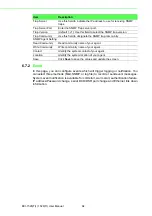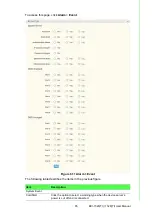
EKI-1526(TI) | 1528(TI) User Manual
66
6.8
Syslogd
The EKI serial device server provides the functionality to allow network devices to
send event messages to a logging server, also known as a Syslog server, by way of
the Syslogd function. The Syslog protocol is supported by a wide range of devices
and can be used to log different types of events.
6.8.1
Syslogd Setting
Users can enable the syslogd function to record historical events or messages locally
or on a remote syslog server.
To access this page, click
Syslogd
>
Syslogd Setting
.
Figure 6.12 Syslogd > Syslogd Setting
The following table describes the items in the previous figure.
Warm Start
Click the option to select a warning type when the device server is
reboot.
Authentication failure Click the option to select a warning type when an incorrect password
is entered.
IP address changed
Click the option to select a warning type when the IP address is
changed.
Password changed
Click the option to select a warning type when the password is
changed.
Ethernet1 link down
Click the option to select a warning type when the Ethernet 1 port is
disconnected.
Ethernet2 link down
Click the option to select a warning type when the Ethernet 2 port is
disconnected.
DCD changed
Port
Click the option to select a warning type of the selected port when a
change in the DCD (Data Carrier Detect) signal indicates that the
modem connection status has changed.
DSR changed
Port
Click the option to select a warning type of the selected port when a
change in the DSR (Data Set Ready) signal indicates that the data
communication equipment is powered off.
Save
Click
Save
to save the values and update the screen.
Item
Description
Item
Description
Syslogd
Click
Enabled
or
Disabled
to set the logging service status.
Save
Click
Save
to save the values and update the screen.
Summary of Contents for EKI-1526
Page 13: ...Chapter 1 1Overview...
Page 17: ...Chapter 2 2Getting Started...
Page 27: ...Chapter 3 3Utility Configuration...
Page 46: ...Chapter 4 4Selecting An Operating Mode...
Page 54: ...Chapter 5 5Setting Up Virtual COM Redirector...
Page 63: ...Chapter 6 6Web Configuration...
Page 84: ...Chapter 7 7Telnet...


